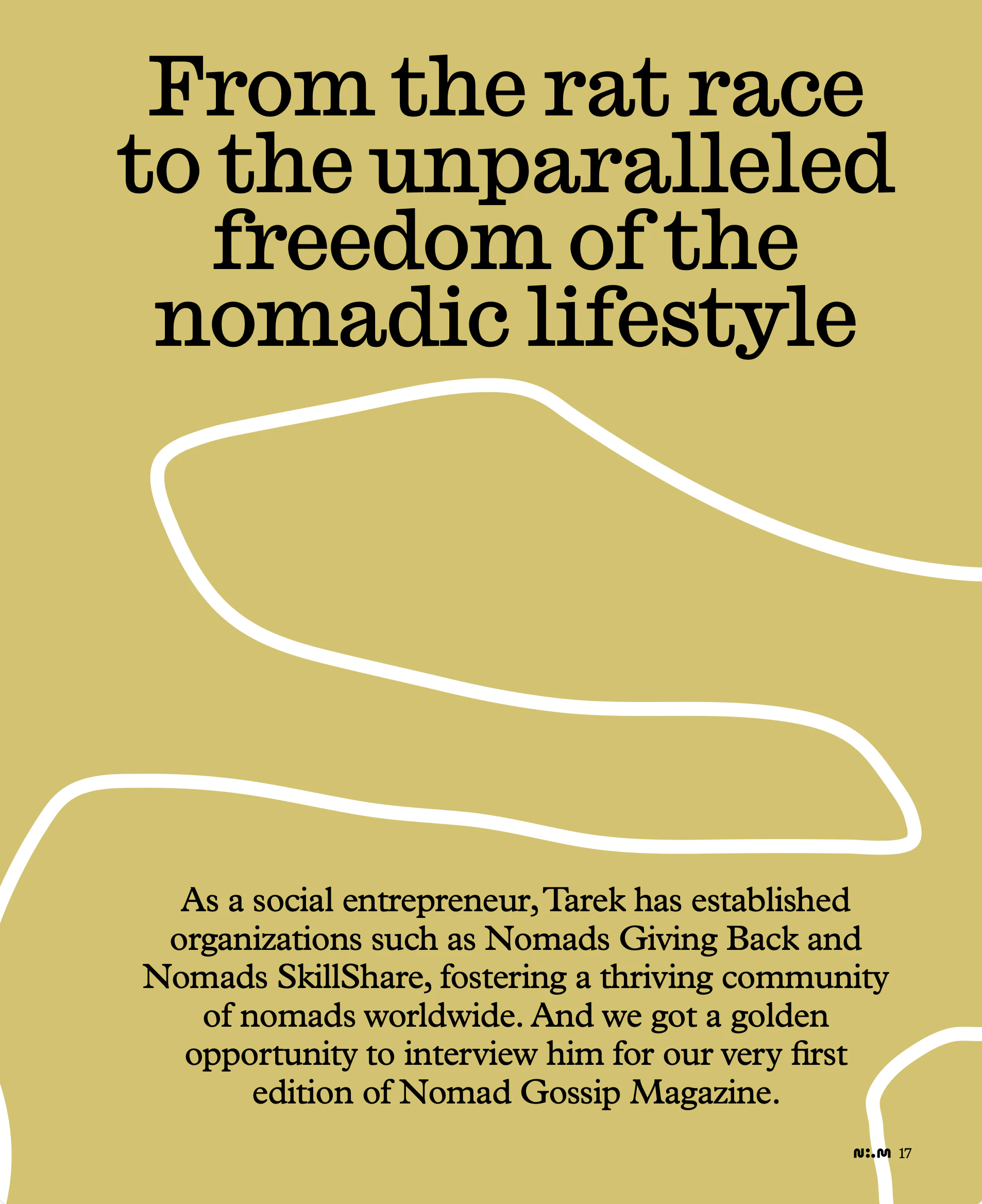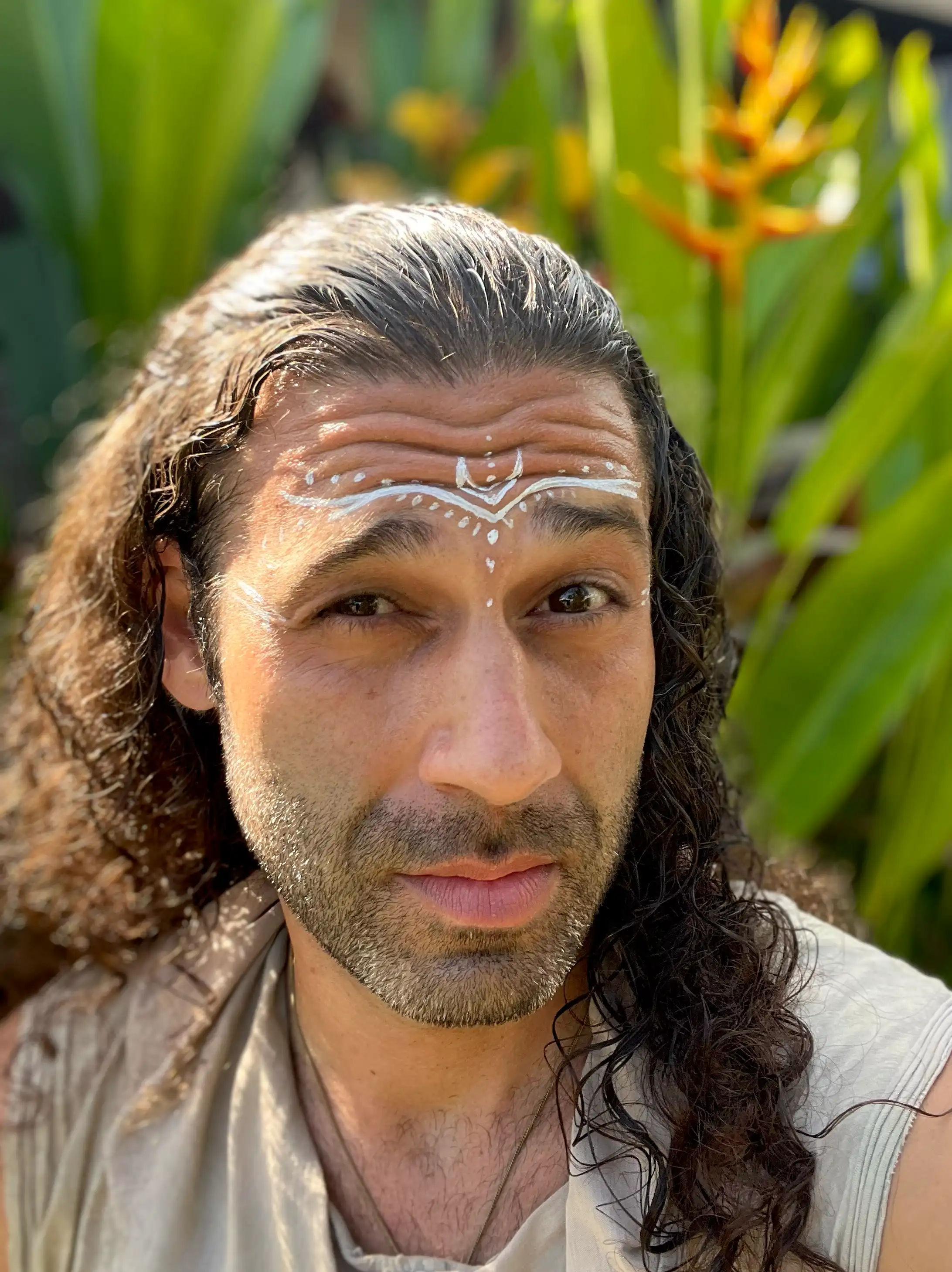
From the Rat Race to Freedom

Tarek Kholoussy
Founder of Nomads Giving Back
What does it really mean to escape the rat race? For Tarek Kholoussy, founder of Nomads Giving Back, the journey from corporate executive to impact-focused nomad wasn't just about changing locations—it was about completely redefining success.
The Golden Handcuffs
Five years ago, Tarek was living what many would consider the American dream. A six-figure salary, corner office in Manhattan, company car, and all the trappings of corporate success. Yet every morning, he felt a growing sense of emptiness as he commuted to a job that paid well but fulfilled nothing deeper.
"I had everything I thought I wanted, but I felt like I was dying inside. The money was good, but my soul was bankrupt."
The turning point came during a particularly brutal quarter when Tarek found himself working 80-hour weeks, missing his daughter's birthday party, and realizing he couldn't remember the last time he felt genuinely excited about his work. The golden handcuffs were real, and they were suffocating him.
The Leap of Faith
The decision to leave wasn't sudden—it was the result of months of careful planning and soul-searching. Tarek began by:
- Building an emergency fund: Saved 12 months of expenses to provide a financial cushion during the transition
- Developing location-independent skills: Transitioned from in-person consulting to digital marketing services
- Testing the waters: Took extended "workations" to see if the nomadic lifestyle truly appealed to him
- Creating an exit strategy: Negotiated a part-time consulting arrangement with his former employer to ease the financial transition
The hardest part wasn't the financial uncertainty—it was overcoming the identity crisis that came with leaving a prestigious career.
Redefining Success
"For years, I measured success by my salary, my title, and the respect I got in corporate circles," Tarek reflects. "But those metrics felt hollow once I started prioritizing impact over income."
The transition required completely reframing what success looked like:
- From profit to purpose: Instead of quarterly earnings, success became measured by positive impact on communities
- From competition to collaboration: Rather than climbing corporate ladders, success meant building meaningful partnerships
- From accumulation to experience: Wealth shifted from material possessions to rich experiences and relationships
Building Nomads Giving Back
The idea for Nomads Giving Back emerged from Tarek's frustration with the stereotypical nomad lifestyle he encountered in his early travels. Too many nomads seemed focused solely on personal freedom without considering their impact on local communities.
"I kept meeting nomads who would complain about gentrification while contributing to it, or who would work from cafes all day without supporting local businesses," Tarek explains. "I realized there was a huge opportunity to channel nomadic freedom toward positive community impact."
The Mission Takes Shape
Nomads Giving Back started small—organizing beach cleanups in Canggu, teaching English in Medellín, and connecting nomads with local volunteer opportunities. But it quickly grew into something more substantial:
- Community partnerships: Working with local NGOs to identify genuine needs rather than imposing external solutions
- Skill-based volunteering: Matching nomads' professional skills with local organizations' needs
- Sustainable tourism: Promoting travel practices that benefit rather than burden local economies
- Cultural exchange: Facilitating meaningful interactions between nomads and local communities
The Reality Check
Tarek is honest about the challenges of building a purpose-driven nomadic life. The first year was particularly difficult:
Financial Struggles
"I went from a steady six-figure income to making maybe $20,000 in my first year as a nomad," he admits. "There were months when I had to choose between a decent Airbnb and having enough money for food."
Isolation and Doubt
The nomadic lifestyle can be lonely, especially when you're trying to build something meaningful rather than just traveling for pleasure. Tarek struggled with imposter syndrome and questioned whether he was making a real difference.
Balancing Impact and Income
Finding sustainable ways to fund impact work while maintaining a nomadic lifestyle required constant creativity and adaptation. Tarek learned to blend consulting work with passion projects, using his corporate skills to fund his impact initiatives.
Lessons from the Journey
Three years into his nomadic journey, Tarek offers these insights for others considering a similar transition:
1. Start Before You're Ready
"You'll never feel completely prepared to leave the rat race. At some point, you have to trust that you'll figure it out along the way. The key is starting with some foundation—skills, savings, or connections—but not waiting until everything is perfect."
2. Purpose Provides Resilience
"When your work is aligned with your values, you can handle much more uncertainty and difficulty. The hard days are still hard, but they feel meaningful rather than meaningless."
3. Community is Everything
"The nomadic lifestyle can be incredibly isolating if you approach it as a solo journey. Building community—both with other nomads and with locals—is essential for both mental health and professional success."
4. Impact Takes Time
"Don't expect to change the world in your first year. Focus on small, consistent actions that align with your values. The bigger impact emerges over time as these actions compound."
The Freedom That Matters
Today, Nomads Giving Back has facilitated over 500 volunteer placements, partnered with 50+ local organizations across 15 countries, and created a community of over 2,000 impact-focused nomads. But for Tarek, the real success isn't in the numbers—it's in the transformation he sees in both nomads and communities.
"True freedom isn't just about working from anywhere. It's about working on something that matters, with people you care about, in service of a purpose bigger than yourself."
The rat race promised security in exchange for freedom. But Tarek discovered that real security comes from building skills, relationships, and purpose that can't be taken away by corporate restructuring or economic downturns.
His journey from corporate executive to impact-focused nomad demonstrates that escaping the rat race isn't just about changing your location—it's about changing your definition of success and having the courage to live according to your values, even when the path is uncertain.
Taking the First Step
For those feeling trapped in their own rat race, Tarek's advice is simple: start small, but start now. Whether it's volunteering a few hours a week, developing a location-independent skill, or simply questioning what success means to you, the journey toward freedom begins with a single step.
"The rat race will always be there if you want to return," Tarek concludes. "But the opportunity to build a meaningful, impact-driven life won't wait forever. The question isn't whether you can afford to leave—it's whether you can afford to stay."

